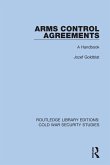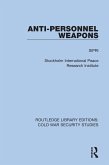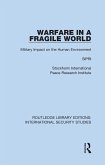Defending Europe
Options for Security
Herausgeber: Paul, Derek
Defending Europe
Options for Security
Herausgeber: Paul, Derek
- Gebundenes Buch
- Merkliste
- Auf die Merkliste
- Bewerten Bewerten
- Teilen
- Produkt teilen
- Produkterinnerung
- Produkterinnerung
This book, first published in 1985, examines the questions of European security that lie at the heart of the confrontation between the superpowers. It concentrates on ways of achieving defence by conventional means rather than a reliance on nuclear or chemical weapons, and at the same time focuses on possible force reductions.
Andere Kunden interessierten sich auch für
![Encyclopedia of Modern War Encyclopedia of Modern War]() Roger ParkinsonEncyclopedia of Modern War145,99 €
Roger ParkinsonEncyclopedia of Modern War145,99 €![The European Community The European Community]() Johan GaltungThe European Community114,99 €
Johan GaltungThe European Community114,99 €![Contemporary Soviet Military Affairs Contemporary Soviet Military Affairs]() Contemporary Soviet Military Affairs139,99 €
Contemporary Soviet Military Affairs139,99 €![Arms Control Agreements Arms Control Agreements]() Jozef GoldblatArms Control Agreements165,99 €
Jozef GoldblatArms Control Agreements165,99 €![Anti-Personnel Weapons Anti-Personnel Weapons]() SipriAnti-Personnel Weapons165,99 €
SipriAnti-Personnel Weapons165,99 €![Warfare in a Fragile World Warfare in a Fragile World]() SipriWarfare in a Fragile World139,99 €
SipriWarfare in a Fragile World139,99 €![Weapons of Mass Destruction and the Environment Weapons of Mass Destruction and the Environment]() SipriWeapons of Mass Destruction and the Environment114,99 €
SipriWeapons of Mass Destruction and the Environment114,99 €-
-
-
This book, first published in 1985, examines the questions of European security that lie at the heart of the confrontation between the superpowers. It concentrates on ways of achieving defence by conventional means rather than a reliance on nuclear or chemical weapons, and at the same time focuses on possible force reductions.
Produktdetails
- Produktdetails
- Verlag: Taylor & Francis
- Seitenzahl: 374
- Erscheinungstermin: 27. Januar 2021
- Englisch
- Abmessung: 234mm x 156mm x 22mm
- Gewicht: 699g
- ISBN-13: 9780367566395
- ISBN-10: 0367566397
- Artikelnr.: 69936302
- Herstellerkennzeichnung
- Libri GmbH
- Europaallee 1
- 36244 Bad Hersfeld
- gpsr@libri.de
- Verlag: Taylor & Francis
- Seitenzahl: 374
- Erscheinungstermin: 27. Januar 2021
- Englisch
- Abmessung: 234mm x 156mm x 22mm
- Gewicht: 699g
- ISBN-13: 9780367566395
- ISBN-10: 0367566397
- Artikelnr.: 69936302
- Herstellerkennzeichnung
- Libri GmbH
- Europaallee 1
- 36244 Bad Hersfeld
- gpsr@libri.de
Derek Paul
Introduction: Political Background R.B. Byers Part 1. Confrontation and
Armaments 1. The Role of New Technologies and Follow-On Forces Attack in
NATO Strategy Fen Hampson 2. Impact of the Development of Modern Arms
Technology on the Confrontation in Europe and the Relationship Between
Conventional and Nuclear defence Vassily Dmitrievich Grishayev Part 2.
NATO: Current Policies and Trends 3. European Defence, and Old Look and a
New Look at Directions that NATO Might Take Karsten Voigt 4. Canada and
Nato: What Price Symbolism? Leonard V. Johnson Part 3. MBFR, Verification
and Confidence Building 5. Eleven Years of the Vienna Talks Vladimir
Mikhailovich Bashakov 6. MBFR: Past and Future Jonathan Dean 7. MBFR:
Problems and Opportunities John D. Toogood 8. Taking a look at NATO's MBFR
Reductions Luc DeSmet 9. A Demilitarized Region for Central Europe and the
Formation of a Verification Peace Force Arnold Simoni 10. Confidence- and
Security-Building Measures Adam Daniel Rotfield Part 4. Alternative
Security 11. Alternative Designs of European Security, the Palme Commission
Report and the Conventionalization of Forces Ulrich Albrecht Part 5.
Non-Provocative Europe 12. Non-Offensive Defence in Europe Anders Boserup
13. Non-Provocative Defence and Disengagement Zones Alvin M. Saperstein
14. Non-Nuclear Defence for Europe Frank Barnaby Part 6. Decision-Making
15. Decision Making in NATO Maurice Archdeacon and Robert Falls Part 7. An
Abolitionist's View and a Round Table Discussion 16. Whose Security Does
Defence Defend? Anatol Rapoport
Armaments 1. The Role of New Technologies and Follow-On Forces Attack in
NATO Strategy Fen Hampson 2. Impact of the Development of Modern Arms
Technology on the Confrontation in Europe and the Relationship Between
Conventional and Nuclear defence Vassily Dmitrievich Grishayev Part 2.
NATO: Current Policies and Trends 3. European Defence, and Old Look and a
New Look at Directions that NATO Might Take Karsten Voigt 4. Canada and
Nato: What Price Symbolism? Leonard V. Johnson Part 3. MBFR, Verification
and Confidence Building 5. Eleven Years of the Vienna Talks Vladimir
Mikhailovich Bashakov 6. MBFR: Past and Future Jonathan Dean 7. MBFR:
Problems and Opportunities John D. Toogood 8. Taking a look at NATO's MBFR
Reductions Luc DeSmet 9. A Demilitarized Region for Central Europe and the
Formation of a Verification Peace Force Arnold Simoni 10. Confidence- and
Security-Building Measures Adam Daniel Rotfield Part 4. Alternative
Security 11. Alternative Designs of European Security, the Palme Commission
Report and the Conventionalization of Forces Ulrich Albrecht Part 5.
Non-Provocative Europe 12. Non-Offensive Defence in Europe Anders Boserup
13. Non-Provocative Defence and Disengagement Zones Alvin M. Saperstein
14. Non-Nuclear Defence for Europe Frank Barnaby Part 6. Decision-Making
15. Decision Making in NATO Maurice Archdeacon and Robert Falls Part 7. An
Abolitionist's View and a Round Table Discussion 16. Whose Security Does
Defence Defend? Anatol Rapoport
Introduction: Political Background R.B. Byers Part 1. Confrontation and
Armaments 1. The Role of New Technologies and Follow-On Forces Attack in
NATO Strategy Fen Hampson 2. Impact of the Development of Modern Arms
Technology on the Confrontation in Europe and the Relationship Between
Conventional and Nuclear defence Vassily Dmitrievich Grishayev Part 2.
NATO: Current Policies and Trends 3. European Defence, and Old Look and a
New Look at Directions that NATO Might Take Karsten Voigt 4. Canada and
Nato: What Price Symbolism? Leonard V. Johnson Part 3. MBFR, Verification
and Confidence Building 5. Eleven Years of the Vienna Talks Vladimir
Mikhailovich Bashakov 6. MBFR: Past and Future Jonathan Dean 7. MBFR:
Problems and Opportunities John D. Toogood 8. Taking a look at NATO's MBFR
Reductions Luc DeSmet 9. A Demilitarized Region for Central Europe and the
Formation of a Verification Peace Force Arnold Simoni 10. Confidence- and
Security-Building Measures Adam Daniel Rotfield Part 4. Alternative
Security 11. Alternative Designs of European Security, the Palme Commission
Report and the Conventionalization of Forces Ulrich Albrecht Part 5.
Non-Provocative Europe 12. Non-Offensive Defence in Europe Anders Boserup
13. Non-Provocative Defence and Disengagement Zones Alvin M. Saperstein
14. Non-Nuclear Defence for Europe Frank Barnaby Part 6. Decision-Making
15. Decision Making in NATO Maurice Archdeacon and Robert Falls Part 7. An
Abolitionist's View and a Round Table Discussion 16. Whose Security Does
Defence Defend? Anatol Rapoport
Armaments 1. The Role of New Technologies and Follow-On Forces Attack in
NATO Strategy Fen Hampson 2. Impact of the Development of Modern Arms
Technology on the Confrontation in Europe and the Relationship Between
Conventional and Nuclear defence Vassily Dmitrievich Grishayev Part 2.
NATO: Current Policies and Trends 3. European Defence, and Old Look and a
New Look at Directions that NATO Might Take Karsten Voigt 4. Canada and
Nato: What Price Symbolism? Leonard V. Johnson Part 3. MBFR, Verification
and Confidence Building 5. Eleven Years of the Vienna Talks Vladimir
Mikhailovich Bashakov 6. MBFR: Past and Future Jonathan Dean 7. MBFR:
Problems and Opportunities John D. Toogood 8. Taking a look at NATO's MBFR
Reductions Luc DeSmet 9. A Demilitarized Region for Central Europe and the
Formation of a Verification Peace Force Arnold Simoni 10. Confidence- and
Security-Building Measures Adam Daniel Rotfield Part 4. Alternative
Security 11. Alternative Designs of European Security, the Palme Commission
Report and the Conventionalization of Forces Ulrich Albrecht Part 5.
Non-Provocative Europe 12. Non-Offensive Defence in Europe Anders Boserup
13. Non-Provocative Defence and Disengagement Zones Alvin M. Saperstein
14. Non-Nuclear Defence for Europe Frank Barnaby Part 6. Decision-Making
15. Decision Making in NATO Maurice Archdeacon and Robert Falls Part 7. An
Abolitionist's View and a Round Table Discussion 16. Whose Security Does
Defence Defend? Anatol Rapoport









